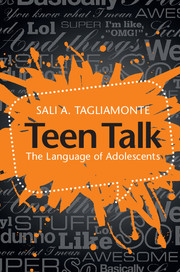Book contents
- Frontmatter
- Dedication
- Contents
- List of figures
- List of tables
- Preface
- 1 What's all the fuss about teen language?
- 2 Teens talking
- 3 Methods: how to tap teen language?
- 4 Quotatives: I'm like,“Oh my God!”
- 5 Intensifiers: upping the ante – super cool!
- 6 How do you start a sentence?
- 7 Sentence enders: finish with a flourish
- 8 Generics: stuffology
- 9 Just: just what?
- 10 Adjectives: the good, bad, and lovely
- 11 Other funky teenage features: You know what? I dunno. Whatever!
- 12 Internet language: everyone's online
- 13 Are they always going to talk like that?
- Notes
- References
- Author index
- Keyword index
6 - How do you start a sentence?
Published online by Cambridge University Press: 05 June 2016
- Frontmatter
- Dedication
- Contents
- List of figures
- List of tables
- Preface
- 1 What's all the fuss about teen language?
- 2 Teens talking
- 3 Methods: how to tap teen language?
- 4 Quotatives: I'm like,“Oh my God!”
- 5 Intensifiers: upping the ante – super cool!
- 6 How do you start a sentence?
- 7 Sentence enders: finish with a flourish
- 8 Generics: stuffology
- 9 Just: just what?
- 10 Adjectives: the good, bad, and lovely
- 11 Other funky teenage features: You know what? I dunno. Whatever!
- 12 Internet language: everyone's online
- 13 Are they always going to talk like that?
- Notes
- References
- Author index
- Keyword index
Summary
Oh okay well okay then I guess that is my destination.
(Trevor Klinke, 20)When a person starts a sentence, which words come out first? According to the grammar books of English, you start a sentence with a subject, e.g. I, she, Sali, my daughter, in order to get sentences such as, e.g. I like cats, Sali likes cats, My daughter likes cats. But that is not what happens in spoken language. Sentences do not always unfold with a subject first. What typically happens is more like: You know, I like cats, So, I like cats, or even So, you know, I think, I like cats. Everyone thinks that it is teenagers who do this, and if not teenagers, people who are uneducated or inarticulate.
In this chapter, I explore the words that come before sentences, including words such as so, well, you know, uh, as in (79). I will refer to these words as “sentence starters,” SS.
a. So uh. Well I really loved it. You know uh I enjoyed it. (William Carlsburg, 82)
b. Oh okay yeah so because you grow up with it, you just don't even hear it. (Ken Smuckers, 53)
In the literature, these words have been included under the general umbrella of “discourse markers” (DMs) (e.g. Jucker and Ziv, 1998; Schiffrin, 1987), “pragmatic markers” (e.g. Andersen, 2001; Brinton, 1996; Erman, 2001), or “discourse-pragmatic markers.” A question that arises is: Are these all the same type of markers? Why are such words sometimes referred to as “discourse markers,” at other times “pragmatic markers,” and sometimes as “particles”? Aside from being words and phrases that have been disparaged as meaningless and bad, what else can be said?
Traditionally, the words in (79) were thought to be empty, meaningless fillers. In the mid 1970s Longacre (1976) referred to them as “mystery particles,” in part because at the time no one really knew what function they served in the language. As we shall see, these words are actually a multifarious set of phenomena and an important part of the grammar of spoken language.
There is a great deal to be learned yet, then, about the interrelations that exist between syntax and semantics, and about the way in which the syntactic structure of informal spoken language can best be analyzed.
- Type
- Chapter
- Information
- Teen TalkThe Language of Adolescents, pp. 95 - 120Publisher: Cambridge University PressPrint publication year: 2016

